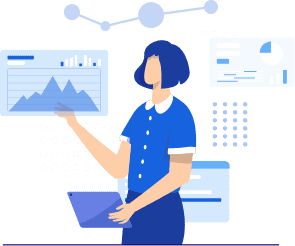Subscribe to Our Newsletter
Stay updated with the latest tips and strategies. Get additional discounts and alerts on offers.

Every day, sales teams face various challenges such as managing complex, customer purchasing journeys to handling huge amounts of data, tracking engagement, and closing deals effectively. Without the right tools in place, measuring and improving sales efforts can feel overwhelming.
Building a powerful sales software stack enables businesses to overcome these challenges head-on by simplifying operations, improving customer relationships, and boosting sales productivity. But what exactly makes up a sales tech stack, and how can organizations assemble the perfect one for their needs?
This comprehensive guide will help you to determine the sales tech stack for businesses of various sizes to streamline their sales process. Before diving into the process of finding the ultimate sales software stack for your company, let’s first understand the basics of what exactly a sales tech stack is.
Without further ado, let’s get started!
A sales tech stack is the collection of software tools and platforms that a business uses to facilitate and boost its sales processes. From customer relationship management (CRM) to sales prospecting data, each constituent serves a unique function, helping sales teams work smarter, not harder.
A well-rounded stack allows businesses to automate repetitive tasks, track customer interactions, and access insights that lead to higher conversion rates.
Now that you’ve come across the basic idea of sales tech stack and their functionality, let’s explore how to build a perfect sales tech stack.
Building the perfect sales tech stack requires careful planning and analysis to ensure each tool works cohesively to solve your specific needs.
Here’s how to build an optimal sales tech stack for your business:
Before diving into software options, assess your current sales process. Are there bottlenecks in communication? Is your team struggling to track leads or manage customer relationships?
Knowing the gaps in your process will help you determine what tools you need to address these pain points. It’s also important to involve your sales team in this assessment, as they will be the primary users of the tools.
Once you’ve identified potential software, compare them based on your specific business needs. Evaluate which software offers the best combination of functionality, scalability, and price.
Make a detailed list of features each software provides and ensure they align with your long-term business goals.
Looking at customer reviews and testimonials will give you real-world insights into how the software performs. What challenges did other users face? How responsive is customer support?
Trustworthy reviews from credible sources can significantly influence your decision.
Most software companies offer free trials. This is an excellent way to get a feel for the software and see if it genuinely fits your sales team’s needs.
During the trial, ensure that your team uses it extensively so you can gather feedback and assess its effectiveness.
To build a perfect sales tech stack, it’s crucial to know a list of several B2B sales tech stack that can help you streamline your sales process.
There is a variety of sales technologies present in the market, but here are the top five that fit every organization’s size.
A CRM system is a foundational tool in any sales stack, as it helps manage customer interactions, streamline processes, and boost profitability. CRMs centralize customer data, track interactions, and enable better communication across teams.
It can be the best tech stack for sales to reduce the amount of time that is involved in complex tasks.
When building a software stack, your sales teams may have encountered thousands – or even millions – of services with promising guaranteed results, effective automation, huge ROI and more.
However, without having quality data to reach your target prospects, every sales technology you accumulate is nothing, just a pile of junk. So, what’s the solution?
When sales reps use low quality leads or databases, they are less likely to close a deal. This could result in missed opportunities and a waste of time and resources.
Moreover, poor quality data can cause unwanted disputes among the departments, such as marketing and sales, which are supposed to work together.
In contrast, high quality data with actionable insights not only avoids these challenges but also allows organizations to reach potential prospects, nurture qualified leads, achieve more sales and conversions.
Are you a sales manager or a SDR looking for accurate, verified contacts to engage with potential leads and close profitable deals faster? Then, DataCaptive is just what you need for sales prospecting data requirements.
DataCaptive offers valuable and go-to-market data which acts as a frontline warrior for your sales software stack. They add industry insights and market trends into your existing contact database to empower sales teams with actionable insights.
As a trustworthy B2B data service provider, they source data from genuine and reliable platforms and validate through a 7-step verification AI and human verification process. This is because to maintain the quality and accuracy of contacts.
The database contains verified email addresses, direct dials, and other key information that perfectly integrates into your sales technologies. Using this contact database, you can easily reach your prospects through cold emails and telemarketing to nurture leads and quickly secure a deal.
At this point, you have a detailed overview of the best sales software stack for organizations of all sizes, as well as the importance of quality and actionable data for boosting your effective sales results. It’s time to explore the top sales software used by various companies based on their sizes.
Small size businesses or startups are always in search of sales technologies that are suitable for their small teams, to manage customer’s data, integration options, and financial capabilities.
The small enterprises such as Trello, BlendJet, Litmus, BambooHR, Wistia, and others utilize the following sales software stack for their diverse sales operations.
The sales software plays an important role in managing various organizational data of mid-size companies. It is widely used for their capacity to store sizable information, widespread integration, and reasonable pricing structure.
Companies such as Copper, Canva, Chargebee, Monte Carlo, Bonterra, and other medium-size businesses utilize sales software to boost their performance.
Here are the top picks of sales software stack for medium size enterprises:
Large companies need extremely advanced technology to simplify their complex sales process. These organizations look for software that centralizes vast customer’s data, has wide integration capabilities, and is available at budget-friendly prices.
Conglomerates such as Amazon, IBM, Microsoft, Apple, and others use sales software stack to enhance the performance of their large teams.
Here’s the top B2B sales tech stack for scaling companies:
Building the ultimate software stack can transform your sales operations, helping you streamline workflows, optimize outreach, and scale your efforts. By adopting the technologies outlined in the guide, you can assemble a compelling sales tech stack for your team.
Moreover, counting only on sales stack tech tools cannot help – you need valuable and go-to-market data to put your sales into action. That’s where DataCaptive’s high quality contacts come into play, empowering your sales teams with actionable insights to close deals faster and more efficiently.
Get a Sample Email List
Show Some Love!

Subscribe to Our Newsletter
Stay updated with the latest tips and strategies. Get additional discounts and alerts on offers.
Related Articles
Subscribe to Newsletter
Stay up to date with the latest marketing, sales, and service tips and news.
